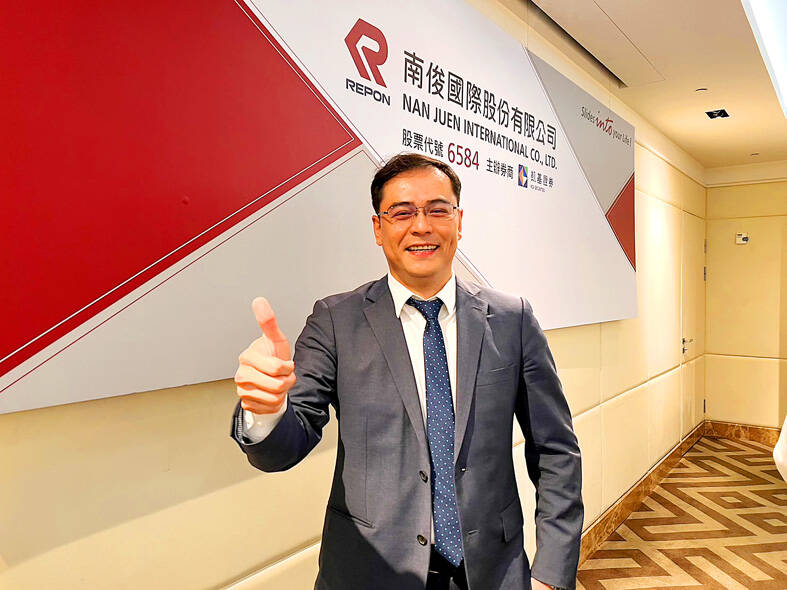Nan Juen International Co (南俊國際), which supplies rail kits used in servers, has entered the supply chain of Nvidia Corp by securing orders for the US chip giant’s GB200 artificial intelligence (AI) servers.
The Taoyuan-based company has obtained Nvidia’s recommended vendor list (RVL) certification and is expected to complete volume production preparations in the third quarter of this year, with initial shipments likely to begin at the end of this year or early next year, the company said at an investors’ conference in Taipei yesterday.
The server rail kit business is expected to make a larger contribution to the company’s revenue next year, Nan Juen said.

Photo: Lin Jin-hua, Taipei Times
The company also supplies rail kits for non-server applications, including office furniture, kitchenware, home appliances and tool cabinets.
In the first half of this year, server rails accounted for 34 percent of the company’s total sales, up from 27 percent at the end of last year, Nan Juen chief financial officer Vincent Jen (任忠仁) told investors.
Server rails are not something that always stand out or attract attention compared with other components, but they are necessary to ensure that servers can be easily installed, modified, maintained or, if necessary, replaced.
Nan Juen began cooperating with US-based Super Micro Computer Inc in 2002 for the mass production of server rails. It entered the data center supply chains of two major cloud service providers in the US in 2019 and 2022 respectively, a document released after the company’s earnings conference showed.
With the Nvidia deal, Nan Juen is to join King Slide Works Co (川湖科技) in becoming the second rail kit supplier for GB200 servers, and analysts expect the two companies to become primary server rail kit suppliers for the world’s major cloud service providers.
Nan Juen reported a net profit of NT$97.34 million (US$3.05 million) in the first half of the year, compared with a net loss of NT$25.47 million in the same period last year, on revenue of NT$905.81 million, a 56.3 percent increase year-on-year.
Earnings per share were NT$1.49 in the first six months, compared with losses per share of NT$0.42 during the same period last year, while gross margin improved 12.21 percentage points to 24.63 percent.
The company expects its business to steadily improve in the second half of this year, with growth momentum to strengthen further next year, it added.

MULTIFACETED: A task force has analyzed possible scenarios and created responses to assist domestic industries in dealing with US tariffs, the economics minister said The Executive Yuan is tomorrow to announce countermeasures to US President Donald Trump’s planned reciprocal tariffs, although the details of the plan would not be made public until Monday next week, Minister of Economic Affairs J.W. Kuo (郭智輝) said yesterday. The Cabinet established an economic and trade task force in November last year to deal with US trade and tariff related issues, Kuo told reporters outside the legislature in Taipei. The task force has been analyzing and evaluating all kinds of scenarios to identify suitable responses and determine how best to assist domestic industries in managing the effects of Trump’s tariffs, he

TIGHT-LIPPED: UMC said it had no merger plans at the moment, after Nikkei Asia reported that the firm and GlobalFoundries were considering restarting merger talks United Microelectronics Corp (UMC, 聯電), the world’s No. 4 contract chipmaker, yesterday launched a new US$5 billion 12-inch chip factory in Singapore as part of its latest effort to diversify its manufacturing footprint amid growing geopolitical risks. The new factory, adjacent to UMC’s existing Singapore fab in the Pasir Res Wafer Fab Park, is scheduled to enter volume production next year, utilizing mature 22-nanometer and 28-nanometer process technologies, UMC said in a statement. The company plans to invest US$5 billion during the first phase of the new fab, which would have an installed capacity of 30,000 12-inch wafers per month, it said. The

‘SWASTICAR’: Tesla CEO Elon Musk’s close association with Donald Trump has prompted opponents to brand him a ‘Nazi’ and resulted in a dramatic drop in sales Demonstrators descended on Tesla Inc dealerships across the US, and in Europe and Canada on Saturday to protest company chief Elon Musk, who has amassed extraordinary power as a top adviser to US President Donald Trump. Waving signs with messages such as “Musk is stealing our money” and “Reclaim our country,” the protests largely took place peacefully following fiery episodes of vandalism on Tesla vehicles, dealerships and other facilities in recent weeks that US officials have denounced as terrorism. Hundreds rallied on Saturday outside the Tesla dealership in Manhattan. Some blasted Musk, the world’s richest man, while others demanded the shuttering of his

Taiwan’s official purchasing managers’ index (PMI) last month rose 0.2 percentage points to 54.2, in a second consecutive month of expansion, thanks to front-loading demand intended to avoid potential US tariff hikes, the Chung-Hua Institution for Economic Research (CIER, 中華經濟研究院) said yesterday. While short-term demand appeared robust, uncertainties rose due to US President Donald Trump’s unpredictable trade policy, CIER president Lien Hsien-ming (連賢明) told a news conference in Taipei. Taiwan’s economy this year would be characterized by high-level fluctuations and the volatility would be wilder than most expect, Lien said Demand for electronics, particularly semiconductors, continues to benefit from US technology giants’ effort